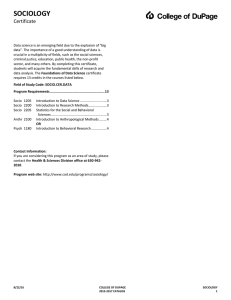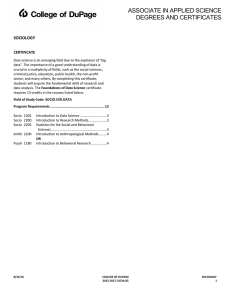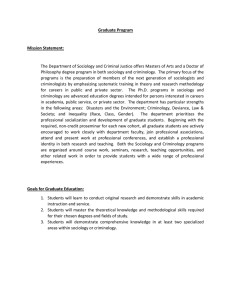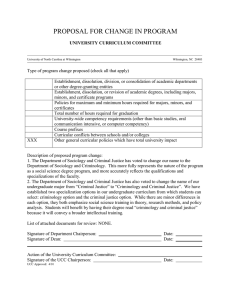Criminology MAJORS AND PROGRAMS GUIDE TO College of Arts & Sciences
advertisement
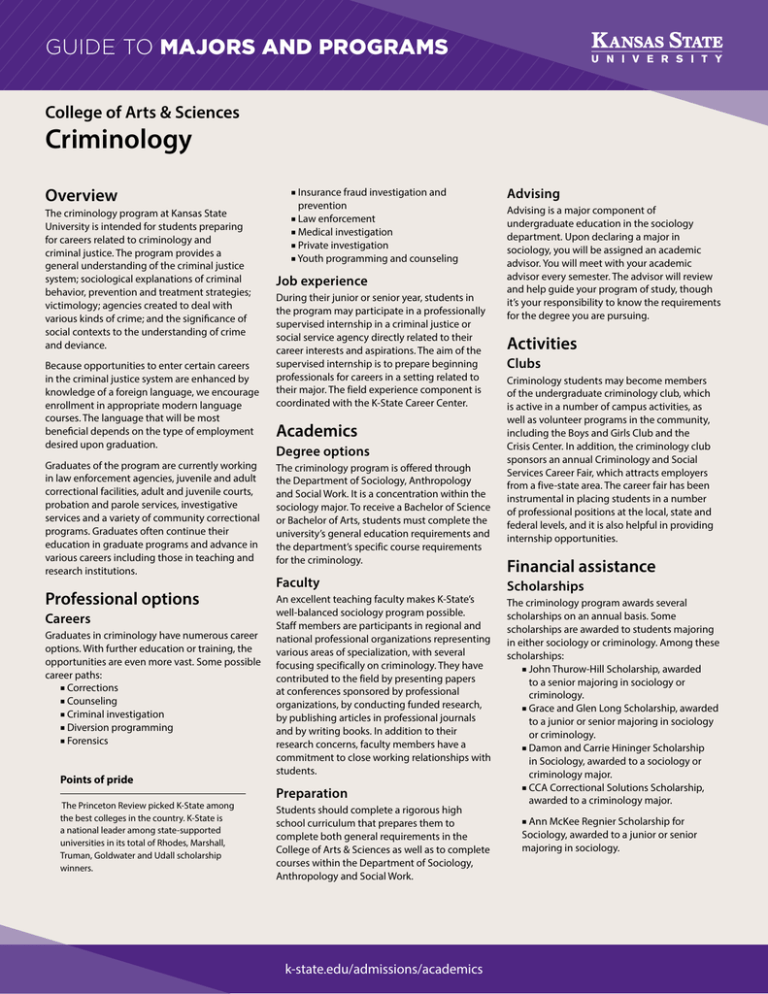
GUIDE TO MAJORS AND PROGRAMS College of Arts & Sciences Criminology Overview The criminology program at Kansas State University is intended for students preparing for careers related to criminology and criminal justice. The program provides a general understanding of the criminal justice system; sociological explanations of criminal behavior, prevention and treatment strategies; victimology; agencies created to deal with various kinds of crime; and the significance of social contexts to the understanding of crime and deviance. Because opportunities to enter certain careers in the criminal justice system are enhanced by knowledge of a foreign language, we encourage enrollment in appropriate modern language courses. The language that will be most beneficial depends on the type of employment desired upon graduation. Graduates of the program are currently working in law enforcement agencies, juvenile and adult correctional facilities, adult and juvenile courts, probation and parole services, investigative services and a variety of community correctional programs. Graduates often continue their education in graduate programs and advance in various careers including those in teaching and research institutions. Professional options Careers Graduates in criminology have numerous career options. With further education or training, the opportunities are even more vast. Some possible career paths: n Corrections n Counseling n Criminal investigation n Diversion programming n Forensics Points of pride The Princeton Review picked K-State among the best colleges in the country. K-State is a national leader among state-supported universities in its total of Rhodes, Marshall, Truman, Goldwater and Udall scholarship winners. I nsurance fraud investigation and prevention n Law enforcement n Medical investigation n Private investigation n Youth programming and counseling n Job experience During their junior or senior year, students in the program may participate in a professionally supervised internship in a criminal justice or social service agency directly related to their career interests and aspirations. The aim of the supervised internship is to prepare beginning professionals for careers in a setting related to their major. The field experience component is coordinated with the K-State Career Center. Academics Degree options The criminology program is offered through the Department of Sociology, Anthropology and Social Work. It is a concentration within the sociology major. To receive a Bachelor of Science or Bachelor of Arts, students must complete the university’s general education requirements and the department’s specific course requirements for the criminology. Faculty An excellent teaching faculty makes K-State’s well-balanced sociology program possible. Staff members are participants in regional and national professional organizations representing various areas of specialization, with several focusing specifically on criminology. They have contributed to the field by presenting papers at conferences sponsored by professional organizations, by conducting funded research, by publishing articles in professional journals and by writing books. In addition to their research concerns, faculty members have a commitment to close working relationships with students. Preparation Students should complete a rigorous high school curriculum that prepares them to complete both general requirements in the College of Arts & Sciences as well as to complete courses within the Department of Sociology, Anthropology and Social Work. k-state.edu/admissions/academics Advising Advising is a major component of undergraduate education in the sociology department. Upon declaring a major in sociology, you will be assigned an academic advisor. You will meet with your academic advisor every semester. The advisor will review and help guide your program of study, though it’s your responsibility to know the requirements for the degree you are pursuing. Activities Clubs Criminology students may become members of the undergraduate criminology club, which is active in a number of campus activities, as well as volunteer programs in the community, including the Boys and Girls Club and the Crisis Center. In addition, the criminology club sponsors an annual Criminology and Social Services Career Fair, which attracts employers from a five-state area. The career fair has been instrumental in placing students in a number of professional positions at the local, state and federal levels, and it is also helpful in providing internship opportunities. Financial assistance Scholarships The criminology program awards several scholarships on an annual basis. Some scholarships are awarded to students majoring in either sociology or criminology. Among these scholarships: n John Thurow-Hill Scholarship, awarded to a senior majoring in sociology or criminology. n Grace and Glen Long Scholarship, awarded to a junior or senior majoring in sociology or criminology. n Damon and Carrie Hininger Scholarship in Sociology, awarded to a sociology or criminology major. n CCA Correctional Solutions Scholarship, awarded to a criminology major. Ann McKee Regnier Scholarship for Sociology, awarded to a junior or senior majoring in sociology. n Admission Requirements All prospective criminology majors must be admitted to K-State through the general university admission process. To learn more about qualified admissions at K-State, please visit k-state.edu/admissions. Suggested coursework General core* Hrs.Course 3 STAT 325Introduction to Statistics 3 Major courses Hrs.Courses 3 SOCIO 211 Introduction to Sociology 3 SOCIO 361Sociology of Criminal Justice Systems 4 SOCIO 423 Methods of Social Research I 3 SOCIO 431 Comparative Social Theories 3 SOCIO 561 Criminology Community Sociology Requirement (select one) 3 SOCIO 432 Community Organization and Leadership 3 SOCIO 531 Urban Sociology 3 SOCIO 533 Rural Sociology 19 Electives Fifteen hours, with at least two courses from each group. A. Criminology electives Hrs.Courses 3 SOCIO 362 Police and Society 3 SOCIO 460 Youth and Crime 3 SOCIO 463 Gangs in American Society 3 SOCIO 470The Criminal Justice System and Family Violence 3 SOCIO 480 Prisons and Punishment 3 SOCIO 562 Study of Serial Murder 3 SOCIO 572 Sociology of the Death Penalty 3 SOCIO 582The Construction of the Criminal Mind 3 SOCIO 635 Sociology of Human Trafficking 3 SOCIO 665 Women and Crime B. Supporting electives Hrs.Courses 3 SOCIO 440 3 SOCIO 450 3 SOCIO 541 3 SOCIO 545 3 SOCIO 570 Social Organization Introduction to Social Interaction Wealth, Power, and Privilege The Sociology of Women Race and Ethnic Relations Professional field experience (optional) 6–9 SOCIO 568Society and Criminal Justice Internship 3 SOCIO 569Society and Criminal Justice Professional Seminar For more information about criminology, contact: Department of Sociology, Anthropology and Social Work Kansas State University 204 Waters Hall 1603 Old Claflin Place Manhattan, KS 66506-4003 785-532-6865 socansw@k-state.edu k-state.edu/sasw For more information about Kansas State University, contact: Office of Admissions Kansas State University 119 Anderson Hall 919 Mid-Campus Drive North Manhattan, KS 66506-0102 1-800-432-8270 (toll free) or 785-532-6250 k-state@k-state.edu k-state.edu/admissions Notice of nondiscrimination Kansas State University prohibits discrimination on the basis of race, color, ethnicity, national origin, sex (including sexual harassment and sexual violence), sexual orientation, gender identity, religion, age, ancestry, disability, genetic information, military status, or veteran status, in the University’s programs and activities as required by applicable laws and regulations. The person designated with responsibility for coordination of compliance efforts and receipt of inquiries concerning nondiscrimination policies is the University’s Title IX Coordinator: the Director of the Office of Institutional Equity, equity@k-state.edu, 103 Edwards Hall, Kansas State University, Manhattan, Kansas 66506, (785) 532-6220. The campus ADA Coordinator is the Director of Employee Relations, charlott@k-state.edu, who may be reached at 103 Edwards Hall, Kansas State University, Manhattan, Kansas 66506, (785) 532-6277. 2016
